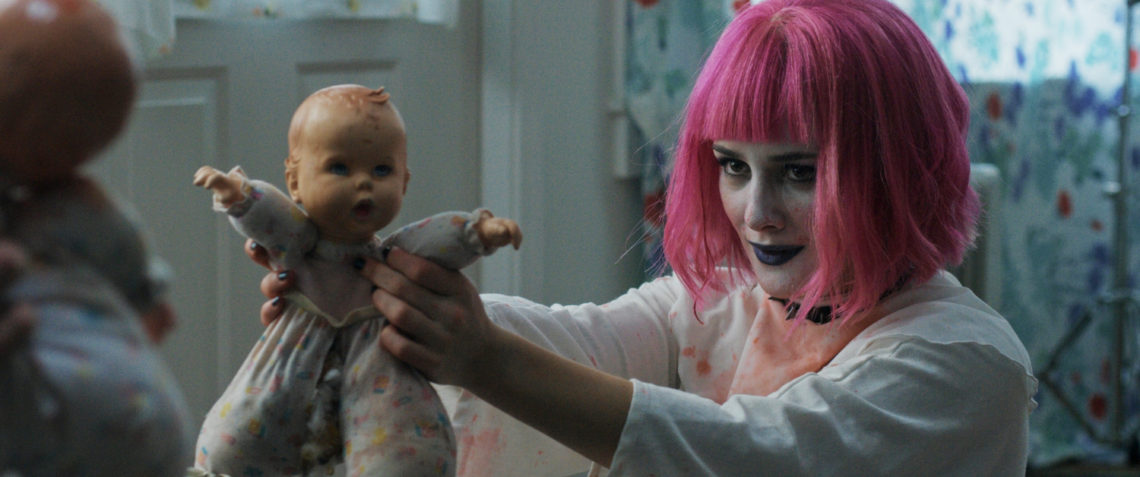“It took God six days to create the universe; you should be able to get your act together in five,” says The Reverend Mother (Barbara Crampton) to young New York-based nun trainee Colleen (Addison Timlin). Collen is set to return home to Asheville, North Carolina for the first time in three years because her brother Jacob (Keith Poulson) has returned from serving in Iraq. Zach Clark’s new film Little Sister follows the week Colleen spends at home reuniting with family and friends and re-embracing her Goth girl past, but though its premise might promise family dysfunction and quirky dark comedy, it never devolves into indie clichés. Instead, it’s a mostly sweet, insightful look at the coping mechanisms people use to accept and understand life’s casual disappointments or, in the lyrics of Marilyn Manson that open the film, turning the tragic into magic.
Before it settles into an accessible groove about halfway through, Clark first immerses the audience in Colleen’s world, depicting her isolated daily routine and her awkward interactions with secular society, before setting her off on her crisis of faith. Though it functions as a typical protagonist introduction, Clark establishes a vague sense of dread, displaced after years of emotional trauma, which lingers throughout the film. Aided by Clark’s clipped editing style and Fritz Myers’ anxious, fast-paced drum score, Little Sister adopts an eerie tone, one that fits with its modus operandi of unseating the audience before settling them into familiarity.
When we finally meet Colleen’s family, Clark doles out character information about them piecemeal, avoiding exposition traps or over-the-top entrances: Her father Bill (Peter Hedges) accommodates and contains household tension, her mother Joani (Ally Sheedy) suffers from depression and has a history of mental instability, and her brother Jacob suffers from severe burns all over his face, rendering him permanently disfigured. Clark’s wonderful sense of narrative economy and rhythm allows these developments to occur naturally without feeling like screenwriter tricks. We wade in the uneasiness of Colleen’s family household as she does, tiptoeing around certain discomfiting ideas or past ugliness, knowing that the proverbial shoe will eventually drop.
If there’s any area where Little Sister excels, it’s in The Moment, the gestures or movements that stand out from the general tapestry. In the first half of this movie, many fly by—Colleen’s awkward politeness around rude New York performance artists, Joani’s motherly rage at Colleen’s tardiness, Colleen’s strange uncle (Tony Greenberg) acknowledging his favorite goat on his farm—but it culminates with Colleen’s interpretive dance to GWAR’s “Have You Seen Me” to cheer her brother up. Donned in full Goth makeup and dyed pink hair, Colleen vamps and preens around the room half-earnestly (there’s enough of a wink for Jacob not to be too uncomfortable) mouthing along to the lyrics and pantomiming with creepy baby dolls. It’s designed to be a showstopper scene, the one where Colleen abandons her pious facade for her coarser image, but Clark never tips the scene into twee caricature, emphasizing the emotional bridge between two distant siblings.
Little Sister also features an interesting political edge that exists almost entirely on the margins, but that effectively invades its way into the center of the frame with ease. The film is set in October 2008; subsequently, everyone has the election on their minds. The television provides updates about dismal job reports. Obama-Biden lawn signs are visible in a few scenes, indicating the political affiliation of the particular area. An environmental activist builds a pipe bomb that remains dormant. Yet, the setting isn’t just scenery, it’s an attempt to situate Jacob’s minor status as a local war hero and to contrast the heated political environment outside the home with the family’s emotional tension. Jacob wants nothing to do with the press that keep calling the house, because he doesn’t want his experience to be flattened and fetishized for cable news fodder. But since he’s so closed off from the world, it’s negatively affecting his relationships with everyone around him, including and especially his fiancée Tricia (Kristin Slaysman). Would Jacob openly sharing his story with the world help his family understand his pain or would it just be a self-defeating act? Clark doesn’t answer this question, instead preferring to draw a line between Jacob and Colleen’s emotional isolation. However, it’s crucial that Clark emphasizes the political stakes of the personal drama, if only because it adds necessary depth to the story.
Unfortunately, the film falls into predictable avenues by its third act, with standard tearful reconciliations and wholly unnecessary narrative turns. But these developments don’t tank Little Sister as much as they theoretically should because of how much prior care and work go into the film up until that point. The committed performances from the entire cast, especially Timlin and Poulson, the pitch-perfect details down to the suburban home décor and the familiar rapport between old high school friends, and some great visual comedy all do quite a bit to help elevate the film beyond its superficially modest story. If anything, Little Sister is a subtly dense film, one that contains multitudes about religious investigation and personal growth without ever underlining the ideas too much, but Clark injects enough genuine warmth and grace notes to make the journey feel as fleet as possible. The tragic becomes magic so quietly, you just might miss it.

















